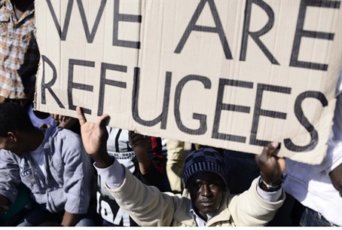- About
- Topics
- Picks
- Audio
- Story
- In-Depth
- Opinion
- News
- Donate
-
Signup for our newsletterOur Editors' Best Picks.Send
Read, Debate: Engage.

| topic: | Refugees and Asylum |
|---|---|
| located: | Mexico, USA |
| editor: | Magdalena Rojo |
They have a dream of a life in the United States or Canada. Some of them are even hoping to bring their family members there, with time. Yet, for now, hundreds of African migrants stay in limbo in Mexican border towns.
Many of them come from the Democratic Republic of Congo (DCR), Cameroon, or Eritrea, countries that have been facing violent times and inner conflicts.
Since the routes to Europe have become more dangerous and some even impossible to cross, smugglers have also searched for different options. African migrants who are now in Mexico took off from their countries and many arrived to Ecuador or Brazil as their jumping-off point. Afterwards men, children, and women - including pregnant ones - crossed various borders, some state seven, others up to ten, using all means possible, only to be stopped in Mexico.
At the end of August, African migrants protested for several days in front of the offices of the National Institute for Migration in Tapachula at the southern border of Mexico and Guatemala. The agreement between the U.S. and Mexico from June that the latter would slow down the flow of migrants towards its northern border has not affected Central American migrants only, but Africans too.
They said they felt stuck because of Mexico’s willingness to bow to Trump. During the first months of the year, Africans were allowed to move through Mexico by the immigration officers. In June, the situation changed. Because the repatriation costs are high, the limbo state has become their destiny, for now.
While blaming the Mexican government for pleasing Trump, according to the Guardian, many migrants coming from Africa do not want to apply for asylum in Mexico itself. They expressed that the country was not safe and they also mentioned the language barrier as discouraging.
In search of a safe and peaceful place, many see the U.S. as their only option. Though some prefer Canada because of the politics of President Donald Trump.
Providing for the whole family that stayed in DCR or Cameroon is definitely more promising from the United States or Canada than Mexico or any other Latin American country. This raises a question if Africans on the move are fleeing from violence or if they are searching for economic benefits. Whichever is true, one thing is clear: there are people on the African continent who are willing to cross the ocean and ten unknown countries to reach their dream and flee their current lives. It is a message that migration is not easy to stop; it just changes the routes.